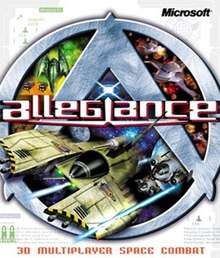Microsoft Allegiance
| Allegiance | |
|---|---|
 |
|
| Developer(s) | Microsoft Research |
| Publisher(s) | Microsoft |
| Designer(s) | Rick Rashid |
| Platform(s) | Microsoft Windows |
| Release | March 16, 2000 |
| Genre(s) | Space simulation, real-time strategy, action |
| Mode(s) | Multiplayer |
| Review scores | |
|---|---|
| Publication | Score |
| GameSpot | 8.7 |
| IGN | 8.2 |
| Award | |
|---|---|
| Publication | Award |
| GameSpot: Best Game No One Played | |
Allegiance is a multiplayer online game providing a mix of real-time strategy and player piloted space combat gameplay. Initially developed by Microsoft Research, the game was later released under a shared source license in 2004 and is maintained and developed by volunteers.
On July 27th 2017 Microsoft Research changed the license from MSR shared source license to MIT license.
Allegiance is an online multiplayer real time strategy/space simulation game. Players pilot spacecraft (from small one-man vessels to large capital ships), flying in a team with other players and trying to gain victory through various means, such as destroying or capturing all enemy bases, or eliminating the enemy's will to fight. Teams are led by a single Commander who makes tactical decisions and invests in technology and bases. Flight and combat is done in either a first or third person view in a 3D environment, with a real-time, top-down "Command View" of the player's immediate surroundings also available.
Flying a ship is unlike other space sims as Allegiance uses a linear drag flight model, where the absolute speeds are limited, but ship inertia still plays an important role in maneuver considerations.
Gameplay involves expanding from one's starting Garrison in order to secure mining areas, and then either destroying enemy bases or destroying his capacity to fight (through economic warfare), much like a conventional Real time strategy game. However, due to Allegiance's combination of RTS and space sim elements, some reviewers classify Allegiance in a genre of its own. Like an RTS, there is a commander who builds bases and miners, controls the team's cash and develops the team's plan for victory. On the other hand, individual units are controlled by other human players instead of a computer AI which faithfully carries out the commander's orders.
...
Wikipedia
